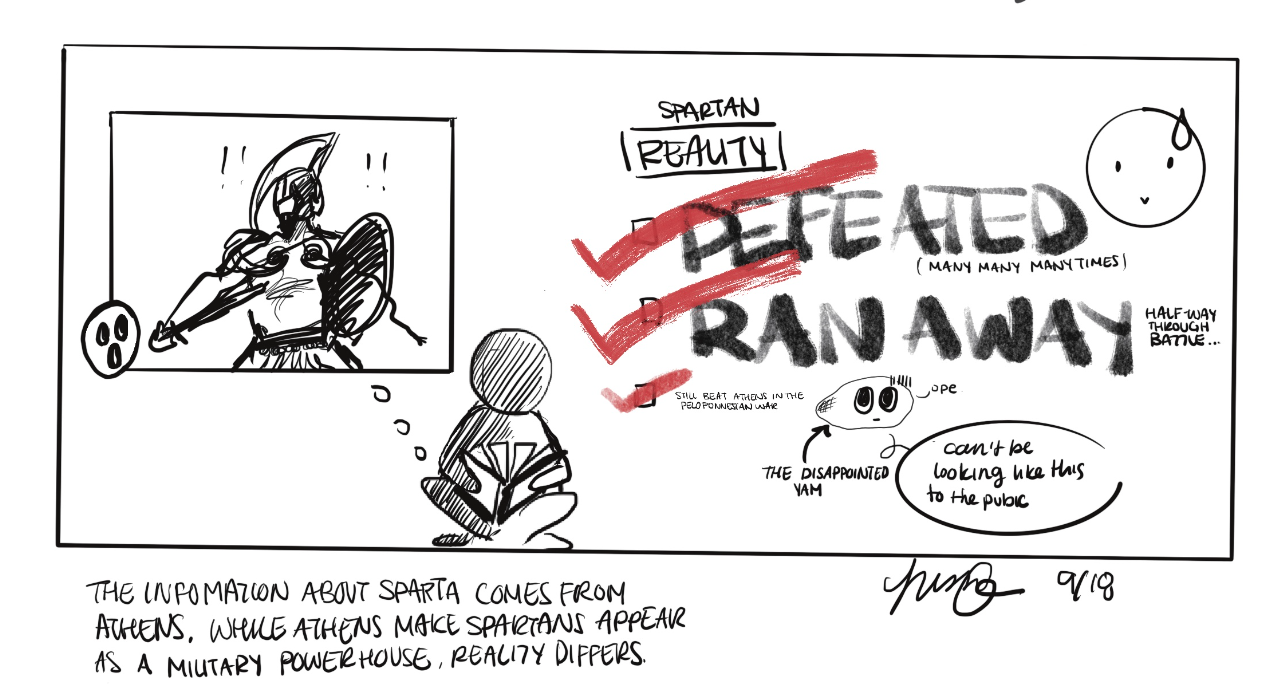Ancient Greece
Meme of the Week
2020 | Procreate
Plato's Kidnapping | In Greek society, kidnapping was normal. Neighbors would kidnap each other to take resources away. Did you know, Plato was kidnapped?! Well, he was and sold into slavery, however, this does not take into account the time frame. Sometime during Plato's kidnapping, Plato was so talkative that he annoyed his kidnappers and they became fed up with him and sent him back.
Hunting | There were so many interesting characteristics of Macedonia, but this stood out the most. I think this captures a beautiful introduction to Macedonia. Macedonian kings (but Alexander the Great) all died from unnatural causes — mainly hunting accidents. In addition, there was a small mention about hetairoi talking to the bodyguards to turn away for a few seconds. If you want to get rid of a king, go on a hunting trip ;) (it's going to be fun they say).
Selinous | A minor topic in our discussion, but I thought it was interesting how valued celery is in Selinous. So, here is a group valuing the celery depicted on the coin.
Battle Attire | Looking at Greek and Persian attire. Persians wore pants, had the figure-eight shield, and lighter armor. On the other hand, Greeks had a bell helmet, armor, and shirt. In other words, it was described in class as a "bell helmet and a shirt flowing in the wind".
Infected | The "flinging" (maybe by catapult...) of plague-infected individuals between Athens and Sparta – I decided to do a quick drawing of that. The Greeks believed that the disease was transmissible by bad air. Although, in reality, it was the contaminated water.
New Polis | I thought about the concept of taking methods/information from the past and applying it to the present (sometimes out of context). In particular, Aristotle's account of how a polis comes to be then copying that foundation and pasting it as part of the new polis.
Talking Tombstones | I decided to do a contrast of tombstones to resemble the competition between families and a switch that occurs in Democratic Athens, which inhibits the families' ability to show off their wealth. Particularly capturing the "talking" aspect of the tombs.
Historians | Greek historians were interested in creating an authentic experience (ie. Thucydides making up speeches to create something even more "real"), which differs from current Historians whose focus is on historical accuracy.
Visit to Sparta | Plutarch's son wanted to go to Sparta, thinking that it was like Disneyland. However, when he ended up going, he was quite disappointed. Geographically, Sparta consists of five villages but not sure what side of the mountain they were on.
The Spartan Reputation | Conceptions of Sparta as a military powerhouse. While in reality, the Spartans lost many battles yet at the same time defeated Athens. Highlighting the idea of reputation manipulation of Athens to make their loss seem less "disappointing" and maintain "honor".
Miasma | The return of the Alkimeondai! Exile only lasts for one generation but the miasma that one attains is passed down through generations. Although Megakles II was not exiled, he brought back the miasma from previous generations.
Alexander the Great | The 80s hairband, flowing locks, and avocado toast really stood out in the discussion. This is what I imagine Alexander's character being like after renaming cities after himself or adding people to his empire.
Rules of the Delian League | One of the many rules stated for the Delian League is to remain together until the iron floats. So I decided to capture the iron watcher(s) who were supposed to keep an eye on the iron until (baby) Poseidon decides to make it finally float -- since Greeks believed in the Gods deciding.













